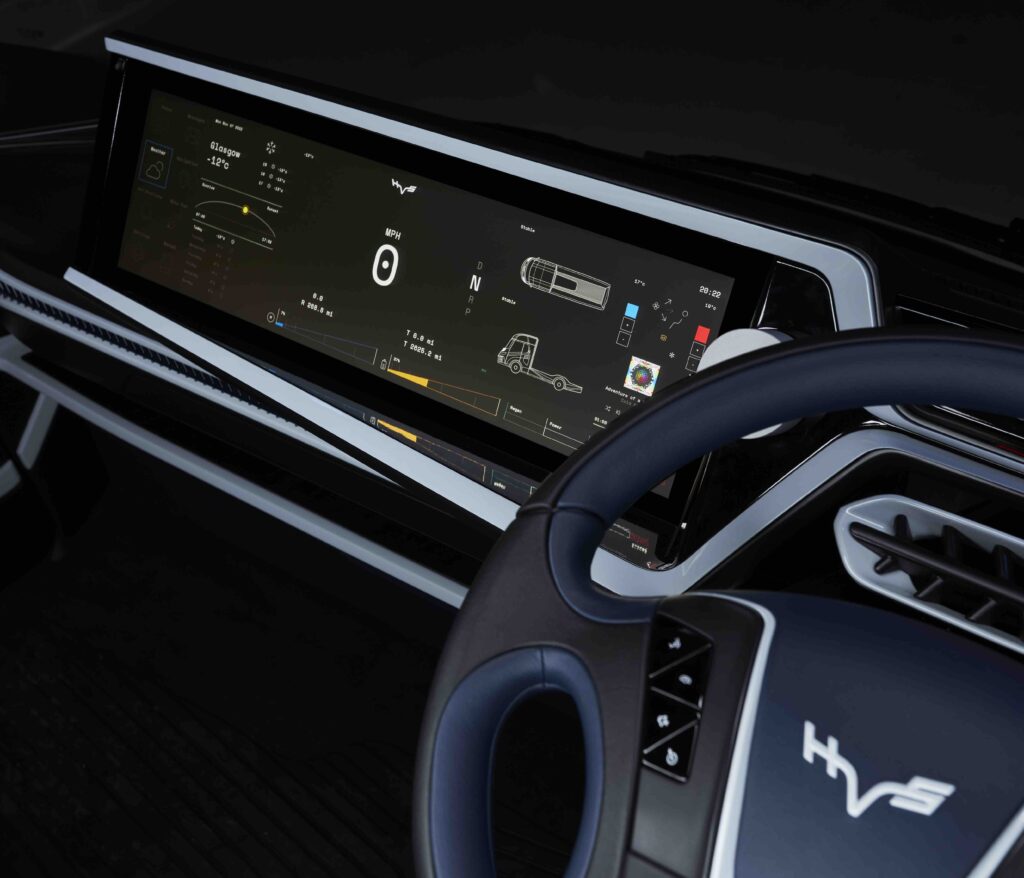Bristol, UK: Two prototype hydrogen-electric tractors are being developed by a consortium involving Fusion Processing, HVS, and Asda.
Fusion Processing will adapt its CAVstar Automated Drive System to provide HVS and Asda with a hydrogen-electric truck, as well as a fully autonomous cab-less vehicle remotely driven for a project called Hub2Hub.
Vehicle testing is scheduled to begin in 2024 following a £6.6m grant to develop and deliver an autonomous zero-emission truck for the UK market. Funding is from the Centre for Connected Autonomous Vehicles that provides joint industry and government funding to showcase the potential of autonomy for transport.
The Centre for Connected Autonomous Vehicles selected the £12m venture as one of seven recipients for its joint industry and government-funding.
The consortium, led by HVS, will build two prototypes The first hydrogen-electric HGV will be fitted with a driver’s cab and tested on the road in autonomous operation, using the Fusion Processing Ltd’s Automated Drive System, CAVStar, with a human safety driver at the wheel.
The second prototype will have the driver’s cab removed and replaced by an aerodynamic fairing. During the project this vehicle will be evaluated on test tracks, with the CAVStar system in this application allowing a remote human driver, located in a control hub, to operate the vehicle.
Together these two prototypes point to a future logistics system where vehicles could be operated in autonomous mode on a hub-to-hub route, with a remote driver then taking control to drive the vehicle from the hub to its end destination, the consortium says.
“Not only will HVS’ innovative HGV decarbonise one of the biggest polluting vehicle sectors on the road, it will expedite the development of Hub-to-Hub automated driving technology, HVS says.
Fusion’s collaboration will see the integration of its vision systems where AI and route planning can deliver a fully autonomous vehicle that takes over from a human driver and hands back control at pre-determined hubs on a route.
Jim Hutchinson , chief executive, Fusion Processing, said: “Our market analysis indicates that the commercial vehicle segments such as haulage are where we will see autonomous vehicle technology first used in large scale deployments.
“Hub2Hub is a perfect showcase of what the advanced version of our CAVstar Automated Drive System can achieve. Combining SAE Level 4 autonomous driving with tele-operation to deliver safer and more efficient vehicle operations.”
Jawad Khursheed, chief executive, HVS, said: “A transport revolution is taking place in the UK and HVS, together with the consortium, is at the forefront of the innovation. We are engineering the world’s first autonomous hydrogen-electric powered HGV to demonstrate hub-to-hub logistics to a leading retailer, Asda, to elevate public perception, showcasing the potential autonomy can deliver thanks to increased safety and fuel savings, and develop new business models.”
Sean Clifton, senior fleet manager, Asda, said: “Reducing our fleet emissions is a major part of our plan of moving towards net zero, so we are keen to look at innovative new technology, such as autonomous HGV tractor units, which can make a real difference to our carbon footprint. We will continue to work with like-minded partners on projects such as this to reduce our impact on the environment.”

Autonomous, self-driving vehicles have the potential to revolutionise haulage and logistics sectors, particularly the long-haul, heavy-duty goods vehicle market, the consortium says.
“The application of this advanced system offers a next-generation solution to today’s shortcomings in the haulage industry, namely solving issues of driver shortages and improvement in driver quality of life, thanks to remote tele-operated vehicles. Drivers can stay local as well as take advantage of less intensive driving shifts, for a greater work-life balance.”
“Fleet operators can also benefit by optimising vehicle utilisation during less busy hours, thereby making logistics more efficient and more environmentally friendly by avoiding congestion. In addition, on-board advanced automated drive systems can reduce energy and tyre emissions by optimising acceleration and braking at a far greater level than human ability.
“Improved operational efficiencies will help create and support new business models by providing never-before-seen freedoms of transport logistics and reductions in vehicle TCO. The automated haulage depots and hubs used for autonomous vehicle technology will also offer improved usage of space, safety and efficiency for operators.
The government is awarding almost £42 million to seven projects through the Centre for Connected and Autonomous Vehicles (CCAV) Commercialising Connected and Automated Mobility (CAM) competition. Industry consortia will match the public grant to around £84 million and will be expected to demonstrate a sustainable commercial service by 2025.
The consortium partners
- Bristol-based Fusion Processing was founded in 2012 to design and build systems for the automation of vehicles and technology to improve vehicle safety.
- HVS was founded 2017 and based in Glasgow, Scotland. It aims to be an early provider of zero-emission trucks using a hydrogen electric vehicle design.







